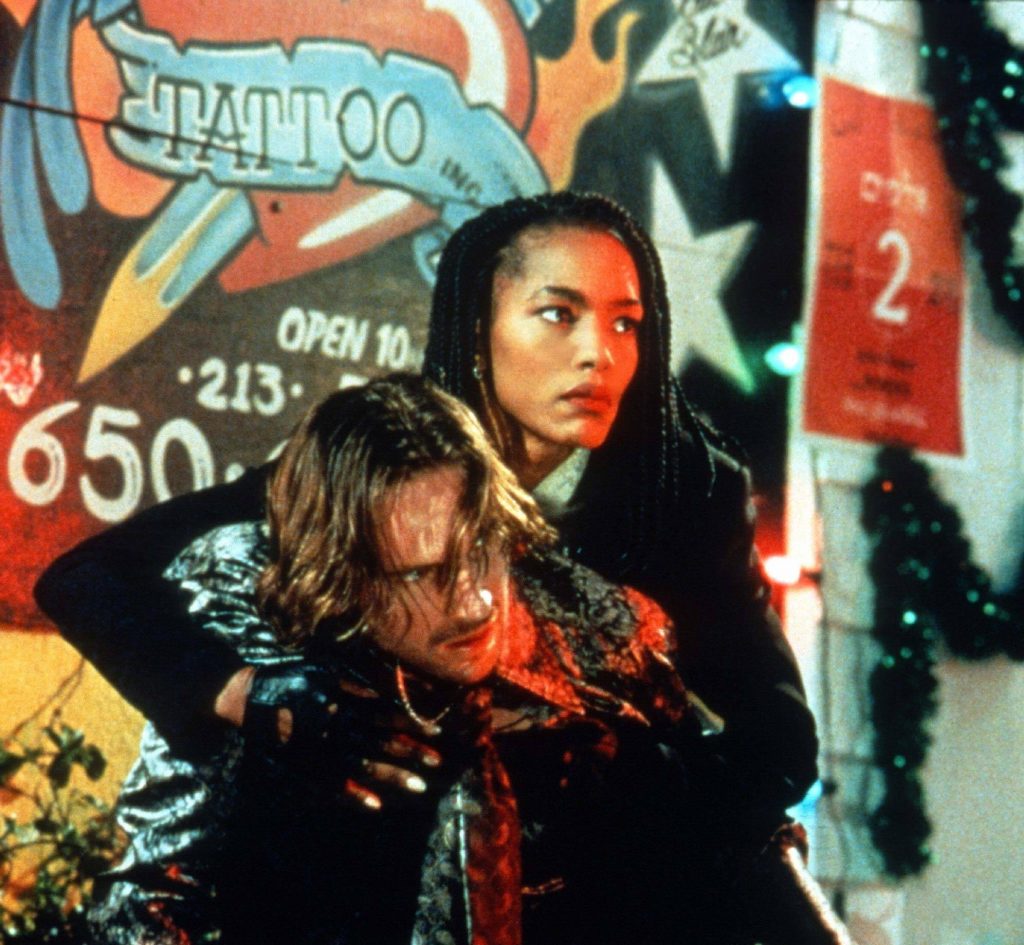In hindsight, the year 2000 did not bring about the end of the world. That seems like an honor belonging to 2020, what with the one million dead from the COVID-19 pandemic, fires burning across various continents, melting Arctic, murder hornets, rampant economic instability, unabated police brutality, and all-around bad vibes. But in the days leading up to the turn of the century, things sure felt bad, and our worries congealed into a shared sense of collective hysteria. What if the Y2K computer virus wiped out all of our electronic identities? What if the Rapture happened? What if our world got set back to zero? The time was defined by an all-enveloping sense of anxiety, the kind of restlessness that seems to restrict all rational thought. In Kathryn Bigelow’s 1995 film Strange Days, the final 48 hours of 1999 capture a Los Angeles sliding into rot and sprinting toward riot. The Los Angeles Police Department (LAPD) acts as an occupying force in its own city, with tanks, SWAT gear, and military backup. People openly brandish guns on the street; there are police checkpoints everywhere; a layer of smoke lingers overhead from burning cars. The world might end in two days. Why bother trying to save it?
Few directors have built their careers so fully around the concepts of law and order as Bigelow. Setting aside her early genre efforts, like The Loveless and Near Dark, Bigelow has regularly crafted films that implicitly defend the criminal justice system and the U.S. military: The sensual thriller Blue Steel, with its feminist depiction of Jamie Lee Curtis as a rookie officer on the trail of a Gordon Gekko-type serial killer. The beloved Point Break, starring Keanu Reeves as college football player turned FBI agent Johnny Utah, tasked with infiltrating a group of surfers and bank robbers led by Patrick Swayze’s Bodhi. The Hurt Locker, Bigelow’s investigation of the toxic lure of the War on Terror and its traumatizing effect on service members, won six Academy Awards, including Best Director (making Bigelow the first and only woman to ever win in that category) and Best Picture. Her follow-up about the U.S. hunt for Osama bin Laden, Zero Dark Thirty, made heroes out of the CIA and was also met with widespread acclaim. It’s a praiseful pattern that Bigelow and frequent collaborator Mark Boal perhaps tried to counterbalance with the grueling Detroit, an extreme swing in the other direction. Their retelling of how racist police officers tortured and killed three Black men in the Algiers Motel during the 12th Street Riot of 1967 was met with fierce criticism for the intensity of its physical and psychological violence, and the film underperformed at the box office.
Commercial failure, though, doesn’t always indicate the quality of a film. That is certainly the case for Bigelow’s entrancingly weird, undeniably prescient Strange Days, which brought in only $8 million despite a $42 million budget and was an undeniable letdown after the success of Point Break. But the film, directed by Bigelow and co-written by her ex-husband James Cameron, is perhaps the former’s most nuanced consideration of the phenomenal power wielded by American police, and of the danger inherent to that level of authority. Similar to Robert Longo and William Gibson’s Johnny Mnemonic, also released in 1995, Strange Days imagines a future in which technological advancement in the form of virtual reality serves as a reprieve from the bleakness of everyday life. If you could step into the life of another person, if you could experience your own memories forever, if you could escape from our dire reality—wouldn’t you?
Those myriad experiences are the products sold by Lenny Nero (Ralph Fiennes), a former LAPD officer turned black market dealer of SQUID recordings. A device that was initially developed for the FBI, the wireless SQUID headset records the wearer’s memories and physical sensations, which can then be burned onto a CD and felt by other people wearing their own headsets. The next wearer experiences the recording in the first person, allowing them to figuratively-but-convincingly step into someone else’s shoes—and Nero’s business is recruiting people to film themselves, paying them for the CD, and then offering that experience to the right buyer. He has rules—“You know I don’t deal in snuff!” he says to associate Tick (Richard Edson) when the man tries to sell him a disc of a robbery that goes wrong and leads to the recorder’s death—but most everything else goes. “One man’s mundane, desperate existence is another man’s technicolor,” Tick says, and there’s a market for nearly any kind of “playback.” Petty crime. Sex. The experience of running on a sunny beach, the wet sand sticking to your toes. The memories left over from a failed relationship, the happy times that you can’t let go. Nero introduces himself to clients as “your Santa Claus of the subconscious,” and as long as your fantasy doesn’t involve death, he’ll make it real.

Around Nero, Los Angeles feels like it could rip itself apart in any moment, especially after the murder of rapper and activist Jeriko One (Glenn Plummer), who before his death encouraged Black Angelenos to demand more from their city. (“We live in a police state,” Jeriko One says to galvanize the Black community, and it’s both eerie and depressing how much Strange Days’s vision of a grim future aligns with our present. Equally demoralizing: the film’s prediction that by 2025, America will be on its second female president.) Nearly everyone in Nero’s tangled web of colleagues, allies, and enemies is somehow affected by the execution-style killing. The ex-girlfriend he can’t stop obsessing over, Faith (Juliette Lewis), is dating Jeriko One’s former manager, Philo Gant (Michael Wincott, doing a strange British accent when he should have stuck with his own instantly recognizable voice). Nero can’t stop begging Faith to come back to him, but she’s committed to the sleazy, misogynistic, and wealthy Gant. Gant, though, is so paranoid that Faith will cheat on him that he hires Nero’s best friend Max (Tom Sizemore), a private investigator, to follow her around. And after Lenny’s car is repossessed, he needs a ride to keep up with Gant, Faith, and Max, so he calls his friend Mace (Angela Bassett), a bodyguard and limo driver who begrudgingly agrees to help Lenny.
Interrupting all this relationship drama is a mysterious disc (left for Lenny at one of those grungy, depraved nightclubs that only exists in ‘90s movies like The Crow and Blade) holding a shocking clip of footage that escalates this tension even higher. “You’re doing it, you’re seeing it, you’re hearing it, you’re feeling it,” Lenny had said to a client about the potential of the SQUID technology, and that promise of surrealism transforms the information now in Lenny’s position into a nightmare—and a threat.
Strange Days follows Lenny and Mace as they try to unravel the mystery around the disc, become involved in another shocking crime, and work together to fight back against a number of foes—all with the looming existential threat of the turn of the century. Admittedly, the film meanders at first, spending nearly the first hour of its 145-minute run time on extensive world building that demonstrates Cameron’s astonishing array of insults for this world (“techno-perv puke” is a favorite, as is “sorry-ass Aryan RoboCop motherfuckers”). There is a certain point of diminishing returns involving Lenny strapping on the SQUID headgear and firing up another sexually themed memory of his relationship with Faith, and Cameron’s script leans too hard on Lenny’s characterization as a tragic romantic hero bamboozled by an ambitious woman. But Strange Days is at its most galvanizing when it makes clear that our greatest enemy is the lust already-powerful men have for more.
The gravelly voiced Gant, who not only possesses Faith but has to demean her, too: “The only time a whore should open her mouth is when she’s giving head.” Two LAPD officers played by Vincent D’Onofrio (easing into the unhinged stage of his career, with Men in Black and The Cell to come) and William Fichtner, who are aware of the rampant racism plaguing their department but care only about how to use it to their advantage. (The LAPD’s 1991 beating of Rodney King has a clear influence on Cameron’s script.) And even Lenny, evoking a ‘70s-era criminal with his gold chain, unbuttoned satin shirts, outlandish ties, and fake gold Rolex, has more power than the average person because of his access to the SQUID technology. The way he leverages that clout puts women in danger and their blood on his hands, and Strange Days is—as Bigelow’s movies often are—uncompromising in its brutality.

Bigelow spent a year developing a specialized camera to capture the first-person POV integral to the world of Strange Days, and the results are impressively engrossing scenes that clearly helped lay the cinematic foundations for future cyberpunk films like 2015’s Hardcore Henry and 2018’s Upgrade. Strange Days opens by inserting viewers into a robbery and later leads us into an amateur porno; each subsequent SQUID-set scene further blurs the lines between the reality we know to be ours and the reality we are borrowing. Most unsettling of all are the film’s harrowing depictions of sexual and racist violence; because of the SQUID technology, the distance between us as the audience and the film as the subject collapses, forcing us from dispassionate observers into anguished participants. In Strange Days, this insertion barely fazes a man like Nero, for whom such trespassing is just business. But for the real hero of this story, Bassett’s Mace, the choice to flee into a virtual world—when there is so much left to fight against in our own—is the ultimate betrayal.
Bassett makes her conflicted longing for Nero clear in the way she struggles to separate her professional responsibilities as his bodyguard and driver from her personal feelings as his friend, in the satisfyingly merciless way she defends him from a group of Gant’s cronies, in the gentleness in her face when she mentions how much her son misses having him around; in the cold disgust that infuses her voice when she realizes that Nero might stand by and let a horrible crime go unpunished. “Maybe it’s time for a war” is Mace’s, and the film’s, best line, and the urgency of the back half of Strange Days comes from Mace’s journey as a Black woman desperate to wring justice—and if not justice, then vengeance—from a system utterly uninterested in providing it.
The ultimate failure of Bigelow and Cameron’s vision is how Strange Days retreats away from Mace’s deserved fury, captured invigoratingly when she uses police officers’ batons, Tasers, and handcuffs against them, and instead placates its own frenzied narrative with a call for civility and decorum. Twenty-five years after its initial release, those respectability politics feel more outdated than any of the sci-fi concepts explored in Strange Days. But Mace’s anger helped save the world, and we need that more now than ever.



